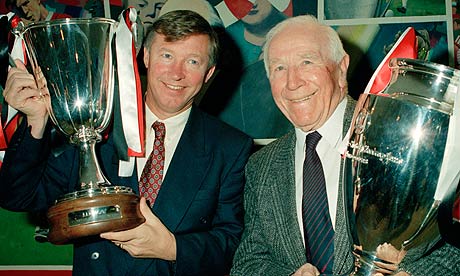
Every now and then a Manchester United apprentice makes the mistake of calling him "Alex". The pup may skip into the canteen at Carrington and see the Manchester United manager of 25 years at a table with a mug of tea and his assistants. "Morning, Alex," the lad will say, or even: "All right, Alex?"
The room will go strangely dark. As our young hopeful sits he will feel an ominous presence by his side. The inadvisability of using "Alex" as a greeting ever again will be conveyed by a hot stream of words. But what happens next, do you suppose? The poor boy is carted off to Rochdale? He becomes a pariah, never to be heard of again?
No. Days later Sir Alex Ferguson will recount the tale with relish, hilarity and even admiration. "Alex" is no way for a 16-year-old to address a manager who has won 12 Premier League titles and two European Cups and survived 25 years of seismic change. No, not survived, but shaped that change. But Ferguson has always been drawn to devilment, character, cheekiness, which is why his teams are rich in personality: a compound of strong‑minded individuals somehow blended into an indivisible unit.
A handful himself, as a muddied centre-forward in Scotland, Ferguson could hardly reinvent his impish nature for the purposes of management. The great dictator image is broadly accurate. Ferguson has always been fascinated by the strong men of history. He knows that either he is in control of his own story or his players are. Never has he yielded that prerogative to men in shorts and boots, as David Beckham, Ruud van Nistelrooy and Roy Keane found out.
His dressing room is no democracy, no place for self-aggrandisement. Yet of all the myths the Fergusons believe they see in media coverage the largest is that United's leader is a human volcano who rules by fear. They point to the great names who have passed across that turf over the past quarter-century and ask: do you really think you could win all those trophies by bullying such powerful and gifted men?
The real miracle of Ferguson's eternal reign has been the past 10 years. In the first 15 he was building on his success at Aberdeen, largely shaping local lads and strong characters he had seen on the pitches of Britain into hardened, winning sides.
There were exotic touches. Eric Cantona and Andrei Kanchelskis prefigured the cosmopolitanism of the last decade. There was a note, though, in Steve Bruce's reminiscences this week that told you what Ferguson was trying to achieve in that first 15-year phase. Of the Fergusonian rage, Bruce, one half of a fine centre-back partnership with Gary Pallister, said: "If you couldn't stand up to that you were no use to him.
"In the early days we knew it was coming because Archie Knox [Ferguson's assistant] had a way of telling us when we were going up the tunnel. He'd tap you on the shoulder and tell you to get ready, it's coming."
A decade or so ago, when he almost retired, and would have given way to Sven-Goran Eriksson, Ferguson veered away from a plan he knew deep down to be disastrous and prepared himself instead for the age of player and agent power, which he has managed equally well, not as the autocrat who yelled at Bruce and Pallister but as a psychologist and politician.
When battles could be won only by expulsion the miscreant was expelled: especially Keane and Beckham. Where the power of the individual has threatened the authority of the manager (his most sacred principle) Ferguson has taken the fight back to the streets of Glasgow and made sure he won.
Any debate about who is the greatest manager in British club football is curtailed very quickly when the evidence of the past 10 years comes into play. Over 15 seasons Bill Shankly turned Liverpool from a club with no running water to moisten the pitch into a regal force, a family. Sir Matt Busby built the United side of Best, Law and Charlton from the wreckage of Munich. At Derby and Nottingham Forest, Brian Clough achieved feats of sorcery with provincial clubs. Bob Paisley remains the only British manager to have won three European Cups.
But none of those great patriarchal figures had to deal with the machine of Beckham's fame; Keane's apparent belief that he, not Ferguson, was now the manager; Cristiano Ronaldo's desire to return to Iberia; Wayne Rooney's urge to pick up the mega-money on offer at Manchester City; the rise of Roman Abramovich's Chelsea; changes in ownership at Old Trafford; or, finally, City's dramatic rise from punchbag to predator on the other side of town.
Any one of these challenges might have trapped Ferguson in a vanished age: the world of Aberdeen, or Steve Bruce. Instead he has rolled with them, modifying his management ideas to extend the glory years. The dictator he presents to the world conceals the father figure who tells a lad off for calling him "Alex" but still admires his spirit and sees life as rich in comedy.

